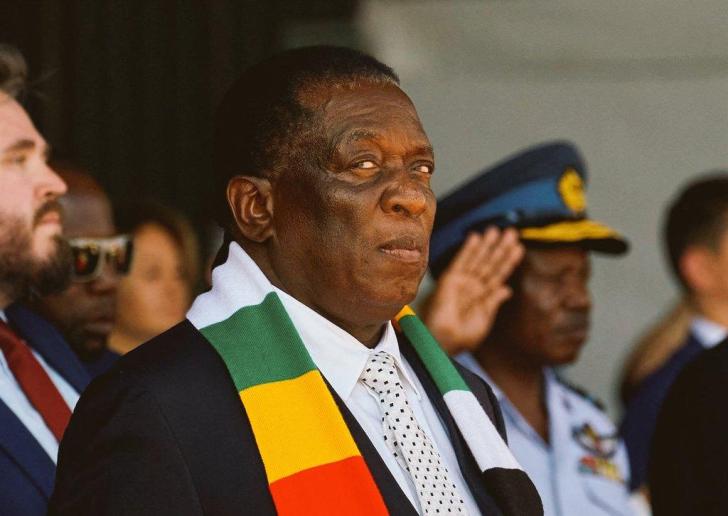News / National
'Mnangagwa no different from Ian Smith'
30 Sep 2024 at 06:54hrs |
0 Views

President Emmerson Mnangagwa's governance has come under fire for being increasingly repressive, drawing parallels to the oppressive regimes of late former Rhodesian Prime Minister Ian Smith and apartheid South African President Frederik Willem de Klerk. Critics argue that Mnangagwa's intolerance towards political dissent mirrors the historical suppression of freedoms experienced in the region.
The 82-year-old Zanu-PF leader has been accused of trampling on the basic rights of political activists since he ascended to power following a military-assisted coup in November 2017. Speaking on the online platform HStv, former legislator Job Sikhala expressed his concerns over the current political climate, likening it to the repressive environments created by Smith and de Klerk in their respective eras.
"The situation which they have created is no different to the one created by Ian Smith in the 1960s and 1970s when he completely shut down political spaces," Sikhala stated. He emphasized that the current environment resembles the actions taken by the African National Congress (ANC) during the brutal apartheid regime, which forced political activists underground in response to severe repression.
Sikhala, who spent nearly two years in remand prison before his release in January, recalled how Smith had banned the operations of the National Democratic Party (NDP), which eventually evolved into the Zimbabwe African People's Union (Zapu). Similarly, he pointed out that de Klerk's government exhibited intolerance towards African nationalism, further stifling dissent.
"The kind of situation that has been created in our country is that the masses have gone underground, and that is very dangerous. Whatever decisions they make in secrecy could have devastating consequences," he warned. He stressed the importance of maintaining open political spaces to monitor the activities of opponents and foster healthy democratic discourse.
Civil Society Organizations (CSOs) and opposition parties, including the Citizens Coalition for Change (CCC) and Zapu, have echoed Sikhala's sentiments, accusing Mnangagwa's regime of systematically stifling dissent. Reports of pretrial detentions, abductions, torture, and killings attributed to the Central Intelligence Organisation (CIO), military, police, and Zanu-PF youth have been cited as tactics employed to suppress opposition.
Sikhala lamented the government's apparent ignorance of the widespread anger among Zimbabweans regarding Mnangagwa's approach. "There is deep-seated discontentment among the citizens of this country that has never been imagined since 1980," he remarked.
He concluded by highlighting the prevailing loathing for the current regime, asserting that the ruling party remains oblivious to the escalating dissatisfaction. "The anger and rage against Zanu-PF, they would not know this because they are seated on the pedestal of monarchical power. Zimbabweans loathe this regime."
The 82-year-old Zanu-PF leader has been accused of trampling on the basic rights of political activists since he ascended to power following a military-assisted coup in November 2017. Speaking on the online platform HStv, former legislator Job Sikhala expressed his concerns over the current political climate, likening it to the repressive environments created by Smith and de Klerk in their respective eras.
"The situation which they have created is no different to the one created by Ian Smith in the 1960s and 1970s when he completely shut down political spaces," Sikhala stated. He emphasized that the current environment resembles the actions taken by the African National Congress (ANC) during the brutal apartheid regime, which forced political activists underground in response to severe repression.
Sikhala, who spent nearly two years in remand prison before his release in January, recalled how Smith had banned the operations of the National Democratic Party (NDP), which eventually evolved into the Zimbabwe African People's Union (Zapu). Similarly, he pointed out that de Klerk's government exhibited intolerance towards African nationalism, further stifling dissent.
"The kind of situation that has been created in our country is that the masses have gone underground, and that is very dangerous. Whatever decisions they make in secrecy could have devastating consequences," he warned. He stressed the importance of maintaining open political spaces to monitor the activities of opponents and foster healthy democratic discourse.
Civil Society Organizations (CSOs) and opposition parties, including the Citizens Coalition for Change (CCC) and Zapu, have echoed Sikhala's sentiments, accusing Mnangagwa's regime of systematically stifling dissent. Reports of pretrial detentions, abductions, torture, and killings attributed to the Central Intelligence Organisation (CIO), military, police, and Zanu-PF youth have been cited as tactics employed to suppress opposition.
Sikhala lamented the government's apparent ignorance of the widespread anger among Zimbabweans regarding Mnangagwa's approach. "There is deep-seated discontentment among the citizens of this country that has never been imagined since 1980," he remarked.
He concluded by highlighting the prevailing loathing for the current regime, asserting that the ruling party remains oblivious to the escalating dissatisfaction. "The anger and rage against Zanu-PF, they would not know this because they are seated on the pedestal of monarchical power. Zimbabweans loathe this regime."
Source - newzimbabwe
Join the discussion
Loading comments…












